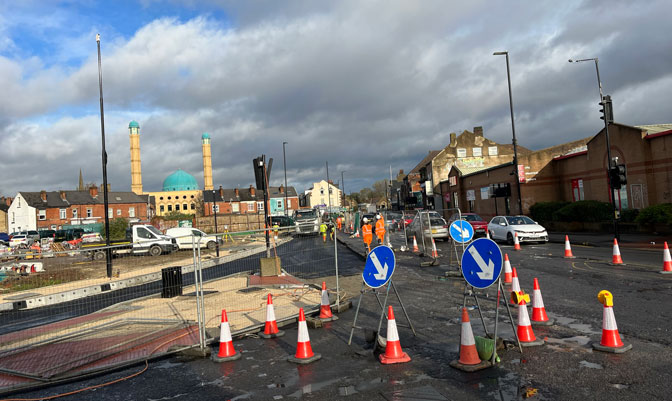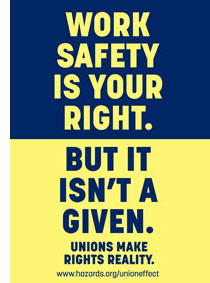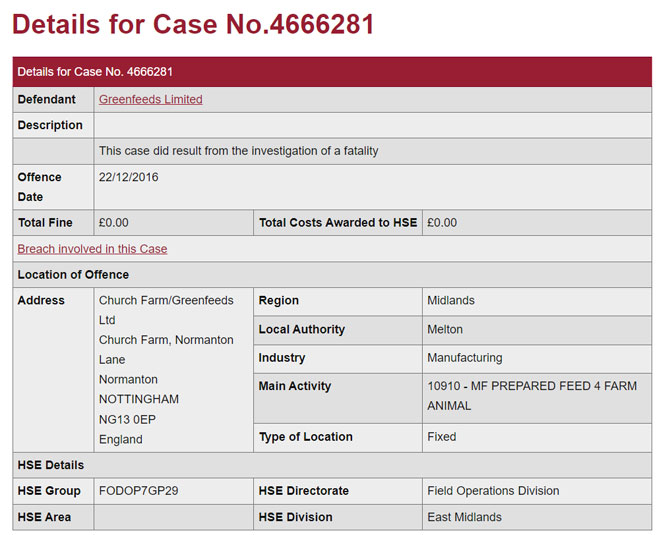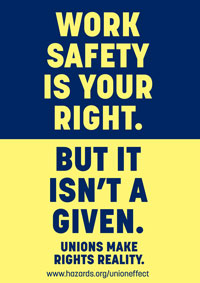
In our campaign for strengthening the laws around deaths at work we demanded bosses found guilty of negligence in the case of a worker death should automatically face a prison sentence.
The TUC and union-backed initiative, driven by the Hazards Campaign and the now defunct Centre for Corporate Accountability, had argued that a law should see negligent bosses jailed. They were getting away with murder, when they should be imprisoned.
This was even more of a problem when it came to larger companies and their directors. In December 1990, John Rimington, who served as director general of the Health and Safety Executive (HSE) from 1984 to 1995, bemoaned the failure of the courts to jail these bosses for safety crimes. “Courts have difficulty connecting top executives to the blood on the shopfloor,” he said.
Corporate cop-out
A Labour government introduced the Corporate Manslaughter and Corporate Homicide Act 2007.
But it wasn’t the law we wanted or that was needed to address the justice shortfall admitted by Rimington. What they gave us was manslaughter legislation that only applies to the business and not those individuals at the top with overall responsibility for how their business is run. It leaves a really bad taste in my mouth to have to say whatever tactics business used in the manslaughter campaign – they won.
How did they win? During our campaign and after, the Centre for Corporate Accountability (CCA) and others projected, on the basis of analysing workplace fatality cases already completed, how many prosecutions under the new corporate manslaughter legislation should be expected.
It wasn’t a massive number – around 45 cases a year – but we have never seen anywhere near that number of prosecutions.
In a 10 June 2024 response to my freedom of information request, the Crown Prosecution Service (CPS) conducted a manual review of its case files to identify prosecutions, convictions and fines since the Corporate Manslaughter and Corporate Homicide Act 2007 came into effect in April 2008.
The CPS lists 43 cases concluded between 2011, when the first case came to court, and 2024. There have been 32 guilty and 11 not guilty verdicts, around three cases a year.
The Act isn’t the only route to justice – and some employers have been imprisoned, on manslaughter or health and safety charges.
Finding out precisely how many is difficult. A search of HSE’s convictions database identifies just nine cases where people have been jailed for workplace health and safety offences.
The database, though, in incomplete – and in some cases, plain wrong. The Greenfeeds Ltd case is on the database, but makes no reference to the jailing of two of the company’s owners or a £2m fine after two staff members drowned in 2016 in a tanker of pig feed.
Gillian Leivers, was jailed for 13 years in 2022 after being convicted of two counts of gross negligence manslaughter and a criminal health and safety offence. Her husband, Ian Leivers, the managing director, was sentenced to 20 months in prison after he was convicted of a criminal breach of safety law.
No mention of the prison terms appears anywhere on HSE’s database. It instead indicates the case concluded with a fine of £0.00.
HSE convictions database record, accessed 12 July 2024.
Big bosses get off
What is undoubtedly true is that the few cases that are taken are against business minnows, whilst the directors of major corporations haven’t even had to break into a sweat about the potential of prosecution, let alone endure one.
In 2005, a BP oil refinery in Texas blew up killing 15 people. The company cut a deal and was fined $373 million for this and other failings. Fundamental to this disaster was corner-cutting on maintenance – when production drops, cutting back on expenses means the site can still appear profitable, a standard business practice that has contributed to many other disasters.
No individual at the top of BP faced charges (Hazards 111). BP’s then chief executive John Browne went on to become Lord Browne of Madingley (Hazards 97).
The company meanwhile continues to attract criticism for safety abuses. A June 2024 report from the US government’s Chemical Safety Board (CSB) into another deadly fire at a BP facility, this time killing two workers, described the company’s decades long, chronic inability to learn from its many mistakes.
The CSB report noted: “During the investigation of the September 20, 2022, incident, BP told the CSB it was unaware of any process safety culture assessment completed at the BP Toledo Refinery since the Baker Panel Report [the 2007 findings of an independent review of the incident].
“The BP Texas City incident is one of several publicly investigated incidents that are so iconic and impactful that they should become part of the basic knowledge of everyone across the chemical industry.” The report instead pointed to “the refinery’s failure to learn from previous incidents.”
This amnesty for the worst bosses has to stop. Responsibility has to go all the way to the top, with the promise of jail for doing wrong.
 Personally, I claim a part in a small but significant victory in construction. With many others I campaigned for negligent bosses to be jailed.
Personally, I claim a part in a small but significant victory in construction. With many others I campaigned for negligent bosses to be jailed.
In 1990, 151 construction workers were killed; last year it was 51. Part of that significant reduction is directly related to our threats – kill and go to jail – influencing management attitudes and priorities. And it’s not just for deaths at work it needs to change.
Those who knowingly run a business in a manner that causes workers to take their own lives – the Post Office Horizon scandal.
Those who knowingly legislate and run a system that leads to the deaths of members of the public – the Grenfell fire tragedy.
Those who ran their business knowing it would endanger the lives of people living nearby or throughout the planet – climate change and environmental damage
Today, a business entity is more likely to suffer for any crime committed – health and safety laws and environmental laws are criminal laws, not misdemeanours – than those who knowingly run a dangerous business for their own and shareholders’ personal gain getting nicked.
And convicting those few guilty individuals who might get charged is still incredibly difficult.
 FRESH BLOOD Workplace justice campaigners are hoping Liz Kendall, Labour’s new secretary of state for work and pensions, will make boardrooms accountable for corporate safety crimes at work.
FRESH BLOOD Workplace justice campaigners are hoping Liz Kendall, Labour’s new secretary of state for work and pensions, will make boardrooms accountable for corporate safety crimes at work.
The change of government provides an opportunity to push again for negligent directors to be held accountable.
Long after the corporate manslaughter law was passed, Labour’s minister responsible for the issue at the time, Lord (Bill) McKenzie, noted his biggest regret was not holding individual directors responsible for failings in the corporate manslaughter legislation.
He argued very strongly against director responsibility at the time. It’s time to put that right.
Whilst we were never going to get improvements to our manslaughter laws under the Tories, with a change of government and Liz Kendall installed as Labour’s new secretary of state at the Department of Work and Pensions – the ministry responsible for workplace safety – I encourage unions to push the debate on the issue along through conferences, at the TUC and into the political arena.
And whenever someone dies at work – the death rate still runs at nearly three every week – that can be the perfect time to discuss the lack of accountability of those individuals responsible.
Rare examples of jail time after work deaths
Company boss Brian Timmins, who caused the death of worker David Willis in an industrial shredder, was convicted of gross negligence manslaughter and jailed in December 2023 for seven-and-a-half years. Timmins was operating the machine when it stopped abruptly. He used a JCB grapple arm to lift Willis up on to the machine, which was still running, to clear the blockage. The 29-year-old worker went into the machine and was killed. Timmins carried on operating the shredder, meaning waste covered David Willis’ remains which were never recovered, but it is believed were sent to landfill.
Wayne Hawkeswood and Graham Woodhouse, both directors of two linked Birmingham metal recycling firms, were jailed in May 2023 after five agency workers died when a 45-tonne wall fell on them. They denied risking workers’ safety when the wall overloaded with 263 tonnes of briquettes collapsed at Shredmet; both men were jailed for nine months and their firms fined £1.6m in total after being convicted of workplace safety offences. Almamo Jammeh, 45, Ousmane Diaby, 39, Bangally Dukureh, 55, Saibo Sillah, 42, and Mahamadou Jagana, 49, died as they cleared a bay at the recycling plant when a 3.6m (11ft 10in) adjacent wall collapsed, smothering them in hundreds of tonnes of metal.
Gillian Leivers, the owner of food waste recycling company Greenfeeds Ltd, was convicted of manslaughter after two employees drowned in pig feed. The then 60-year-old, who was responsible for the day-to-day running of the site, was handed a 13-year prison sentence in June 2022 after being found guilty of gross negligence manslaughter at an earlier trial; her husband, Ian Leivers, who owned and ran the company with his wife, was jailed for 20 months after being found guilty of criminal breaches of safety law. Nathan Walker, 19, and Gavin Rawson, 35, died a few days before Christmas 2016 after getting into difficulties while cleaning out a tanker in Normanton, Leicestershire.
DEADLY OVERSIGHT
Safety activist Mick Holder was instrumental in the campaign that won a corporate homicide act. But here he examines the built-in fatal flaws in the law that meant justice was never really delivered.
| Contents | |
| • | Introduction |
| • | Corporate cop-out |
| • | Big bosses get off |
| Related stories | |
| • | Rare examples of jail time after work deaths |
| Hazards webpages | |
| • | Deadly business |


